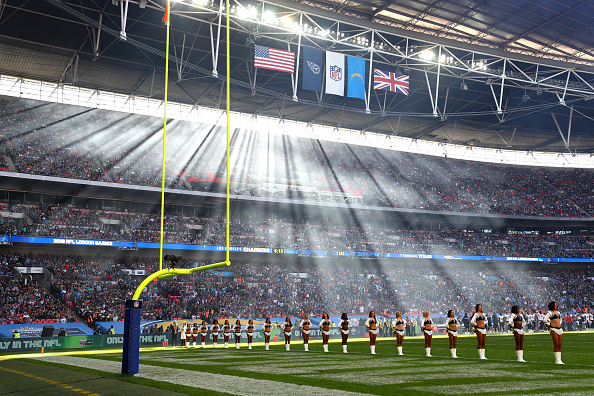The NFL can overtake endemic UK sports – it’s a change 40 years in the making

The NFL is back in London for its annual games and has ambitious plans for the UK, writes sports marketing expert Neil Hopkins.
It’s 1982. Unemployment tops 3m, Blade Runner hits UK cinema screens predicting post-apocalyptic Los Angeles in 2019, and the Hacienda nightclub opens to bring colour to post-industrial Manchester.
Meanwhile, something noisy, vibrant and colourful hits Sunday night TV like a runaway train as Channel 4 ends the roadblock of religious shows by screening highlights of the NFL.
For kids in the 80s, the NFL might as well have arrived through a time machine from 2019, so distinct was it compared to anything in Britain at the time. For a sport at the heart of American culture, its future in the UK was bright. By 2019, it was orange as Los Angeles hit London in the form of the Rams. Not even Ridley Scott predicted that ever happening.
Depeche Mode toured the US in 1982 for the first time, and these days, American football fans in the UK just can’t get enough. As the NFL returns to the capital for the next three weekends, tickets are as rare as hen’s teeth.
The League has staged over 30 games since the Giants played the Dolphins in 2007 and every year they sell out, with tickets scooped up by hardcore NFL fans within hours of going on sale.
Wembley and then Tottenham Hotspur stadiums will be riots of colour with crowds sporting every jersey of every franchise because, despite the Falcons playing the Jaguars, watching the real thing in the flesh remains the absolute priority of all NFL devotees.
The NFL’s challenge though, as it is for all other sports in Britain bar football, is to increase its popularity amongst a younger audience – one less likely to watch on Sky Sports or the NFL’s own GamePass, now available via streaming platform Dazn.
Its answer is to launch a new campaign – A Different League – based on the notion that the NFL is a sporting and cultural phenomenon dramatically different to anything else UK audiences will ever experience.
Pre-season kicked-off with the Netflix series Quarterback, a gridiron Drive to Survive featuring Patrick Mahomes and his Kansas City Chiefs’ relentless march to Super Bowl victory back in February.
Coming into the season, weekly highlights have moved from BBC to ITV, with Jason Bell and Osi Umenyiora also transferring to the new channel with a brief to make the sport even more accessible.
When it comes to the London games, the now-traditional NFL takeover has grown to become a grand-scale live experience at Battersea Power station. The NFL in the UK is also becoming commercially successful in its own right, attracting partners as diverse as Old El Paso, Virgin Atlantic and 888 Sport.
What is striking about the League in the UK is the way it behaves as a challenger brand, despite being arguably the most successful commercial operation in the history of sport (or sports, as they say across the pond). That suggests it may well be successful in attracting the younger, more discerning Gen Z audience eager to discover and celebrate The Next Big Thing.
At the same time, almost every major organisation has attempted to emulate the NFL in the way they stage major events, from music to food to the overall fan experience.
This week Usher was revealed as the star of the half-time show at Super Bowl LVIII, an annual event that has become the defining sport-entertainment crossover and has been mimicked by, amongst others, Uefa at the Champions League Final.
Even the very notion of franchises has been rinsed and repeated by multiple sports including cricket and rugby, eager to replicate the success of the league of Giants, Lions, Dolphins and so on.
The NFL’s aim of outmuscling endemic UK sports and capturing the hearts and minds of young British fans is ambitious. But with over 40 years of groundwork having already been laid, it seems eminently achievable.
Meanwhile, with tens of thousands of British NFL disciples descending, Wembley this Sunday and Tottenham Hotspur Stadium will certainly not be places to enjoy the silence.
Neil Hopkins is global head of strategy at M&C Saatchi Sport and Entertainment.